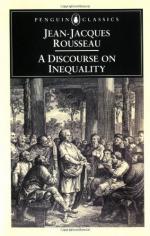
|
| Name: _________________________ | Period: ___________________ |
This test consists of 15 multiple choice questions and 5 short answer questions.
Multiple Choice Questions
1. What does Rousseau compare in his illustration in "Chapter 6, A Discourse on the Origin of Inequality, Appendix"?
(a) Governmental rule and religious rule.
(b) Modern time to prehistoric time.
(c) The modern man to the savage man.
(d) The modern woman to the savage man.
2. What does Rousseau mention men differ in as common character starts to develop within the human?
(a) Beauty and talent.
(b) Wealth only.
(c) Wealth and beauty.
(d) Beauty and wealth.
3. What does philosophy do?
(a) Introverts the human.
(b) Enlightens the human.
(c) Isolates the human.
(d) Broadens the human.
4. What does "A Discourse on Inequality" of Rousseau's focus on aside from morality?
(a) Detriment.
(b) The outcome of equality.
(c) Political equality.
(d) Results of inequality.
5. What does nature tell humans?
(a) Preserve his strength.
(b) Be kind.
(c) Preserve the land.
(d) Do good for himself.
6. According to Rousseau, what is the natural or physical inequality established by?
(a) Weather.
(b) Society.
(c) Government.
(d) Nature.
7. What do men have that can be combined, according to Rousseau?
(a) Senses and fears.
(b) Fears and wants.
(c) Ideas and desires.
(d) Ideas and senses.
8. What would make property rights equal?
(a) War.
(b) New government.
(c) New leadership.
(d) If human talents were equal.
9. What does natural inequality produce, according to Rousseau?
(a) National inequliaty.
(b) Personal inequality.
(c) Economic inequality.
(d) State inequalitry.
10. What leads to sex for man, according to Rousseau?
(a) Lust.
(b) Natural sentiment.
(c) Carnal desire.
(d) Love.
11. What does Rousseau believe divides a repressed man?
(a) Amore-propre and primitive emotions.
(b) Carnal and natural desire.
(c) Reflex and emotions.
(d) Instinct and reflex.
12. What does amore-propre preserve?
(a) The greed.
(b) The nature.
(c) The desire.
(d) The species.
13. What can society no longer exist on after luxury is introduced, according to Rousseau?
(a) Peaceful existence.
(b) Crops.
(c) Private income.
(d) Plants and acorns.
14. What does Rousseau think about the man who invented property rights?
(a) He was smart.
(b) He pulled one over on his fellows.
(c) He was rude.
(d) He doesn't say anything about it.
15. According to Rousseau, what is the savage man of nature focused on?
(a) Self knowledge.
(b) Self preservation.
(c) Arts and sciences.
(d) Survival.
Short Answer Questions
1. What does Rousseau believe does not preserve one's liberty?
2. According to Rousseau, what do passions allow for the human?
3. According to Rousseau, what is the outcome of man's labor?
4. How does Rousseau see the state of man in "Chapter 6, A Discourse on the Origin of Inequality, Appendix"?
5. How many types of inequality does Rousseau see among humans in "Chapter 4, A Discourse on the Origin of Inequality, Part One"?
|
This section contains 419 words (approx. 2 pages at 300 words per page) |

|




